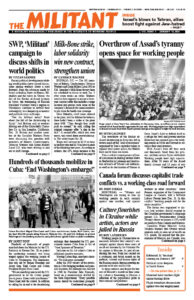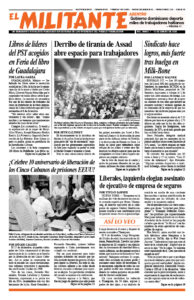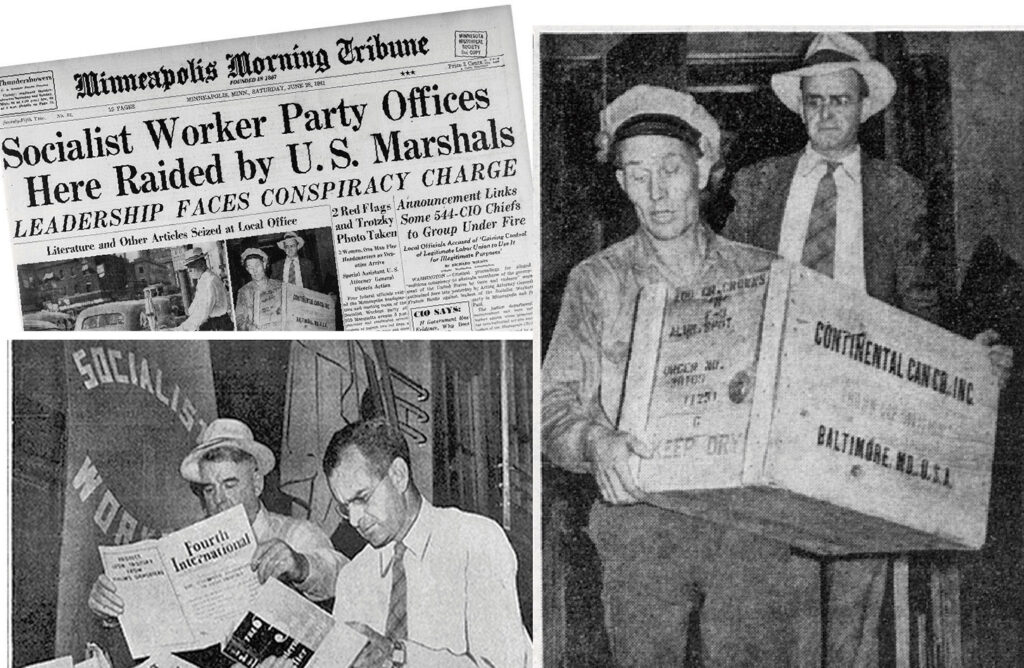FBI on Trial: The Victory in the Socialist Workers Party Suit Against Government Spying is one of Pathfinder’s Books of the Month for January. In 1987 the SWP won its 15-year legal and political battle against decades of illegal FBI spying, harassment and disruption. It was a victory for the whole working class, expanding the right to practice politics free from government interference. The excerpts below are from the introduction by Margaret Jayko. Copyright © 1988 by Pathfinder Press. Reprinted by permission.
This book is about a historic victory for democratic rights. It contains the federal court decision that codifies the accomplishments of the successful fifteen-year legal battle waged by the Socialist Workers Party (SWP) and Young Socialist Alliance (YSA) against decades of spying, harassment, and disruption by the Federal Bureau of Investigation.
The ruling in this case places a valuable new weapon in the hands of all working people fighting to defend their rights and living standards and all those struggling for progressive social change. It can and should be used widely to win broader freedoms for everyone.
The SWP and YSA filed the lawsuit July 18, 1973, in federal court in Manhattan. They charged government agencies with “illegal acts of blacklisting, harassment, electronic surveillance, burglary, mail tampering, and terrorism” against the socialist organizations. They demanded a court injunction to halt these illegal activities and that the government be ordered to pay damages.
The trial opened in New York April 2, 1981, and continued for three months. In eight years of pretrial proceedings the plaintiffs had managed to pry hundreds of thousands of pages out of the secret files of the FBI and other government police agencies. …
Five years after the trial, on August 25, 1986, U.S. District Judge Thomas Griesa ruled in favor of the plaintiffs. The judge found the FBI guilty of violations of the constitutional rights of the SWP and YSA and of their members and supporters.
On August 17, 1987, Judge Griesa issued an injunction barring any further government use of the FBI files on the SWP, YSA, and their members and supporters that had been compiled illegally. …
Judge Griesa found that “the FBI’s disruption activities, surreptitious entries and use of informants” were “violations of the constitutional rights of the SWP and lacked legislative or regulatory authority.”
The court ruling provides a compelling summary of the government’s illegal operations against the SWP and YSA as revealed in the case. Judge Griesa dealt extensively with the FBI’s use of informers to spy on and seek to disrupt the SWP and YSA. …
The decision in this case codifies significant advances for political rights. Important new ground has been conquered in extending the right to privacy of political organizations and individual activists. This, more than any other single issue, was at the heart of the case.
For the first time a federal court has ruled that the very presence of government informers in a political organization is a violation of the constitutional rights of free speech and association and the right to privacy. “The FBI’s use of informants clearly constituted invasion of privacy,” wrote Griesa.
After reviewing the record of more than four decades of FBI spying and disruption, Judge Griesa concluded that “there is no evidence that any FBI informant ever reported an instance of planned or actual espionage, violence, [or] terrorism.” Instead, the informers helped the FBI amass “thousands of reports recording peaceful, lawful activity by the SWP and YSA.” They also carried out FBI orders to “suppress recruiting activities,” to “frustrate the growth of the organizations,” and “to attempt to disrupt them.”
Without the right to conduct their affairs in private, the decision states, the freedom of association of those whose views are opposed by the government is violated. This decision reinforces and extends important previous victories by the civil rights movement and women’s rights struggles in establishing a constitutional right to privacy.
The court decision also recognizes that the government cannot ignore Fourth Amendment protections against arbitrary searches and seizure by justifying measures such as burglaries, “bugs,” and wiretaps on grounds of “national security” interests.
The FBI burglaries were “obvious violations of the Fourth Amendment,” wrote Judge Griesa. “The FBI knew this full well. There was no statutory or regulatory authorization for such operations.” …
Government lawyers argued throughout the course of the suit that the FBI operations were legally justified because of the SWP’s Marxist views and communist activities. This was rejected by the court.
The ruling makes clear that protection of the right to be free from unconstitutional government activities applies to communist organizations such as the SWP and YSA, as well as to noncommunist groups.
The program and activities of the SWP since its founding in 1938 were very much at the heart of this fight. The SWP called many witnesses to the stand during the trial to testify about the party’s views, organization, and actions. In addition, dozens of government witnesses, ranging from a former U.S. attorney general and other top Department of Justice officials to FBI street agents, explained the FBI’s goals and methods in combating “subversion.”
The first two witnesses were Farrell Dobbs, SWP national secretary from 1953 to 1972; and Jack Barnes, who became national secretary after Dobbs.
On the witness stand, Dobbs traced the history of the SWP, described some of the party’s fundamental political concepts, and discussed the 1941 conviction of eighteen leaders of the party and the Teamsters union in Minneapolis — including himself. They were imprisoned under provisions of the thought-control Smith Act, which makes advocacy of communist ideas illegal. Dobbs testified that the views the SWP advocates today are the same as the ones he and others were imprisoned for during World War II. Dobbs’s testimony is cited extensively by Griesa in his decision.


